Comments
- No comments found
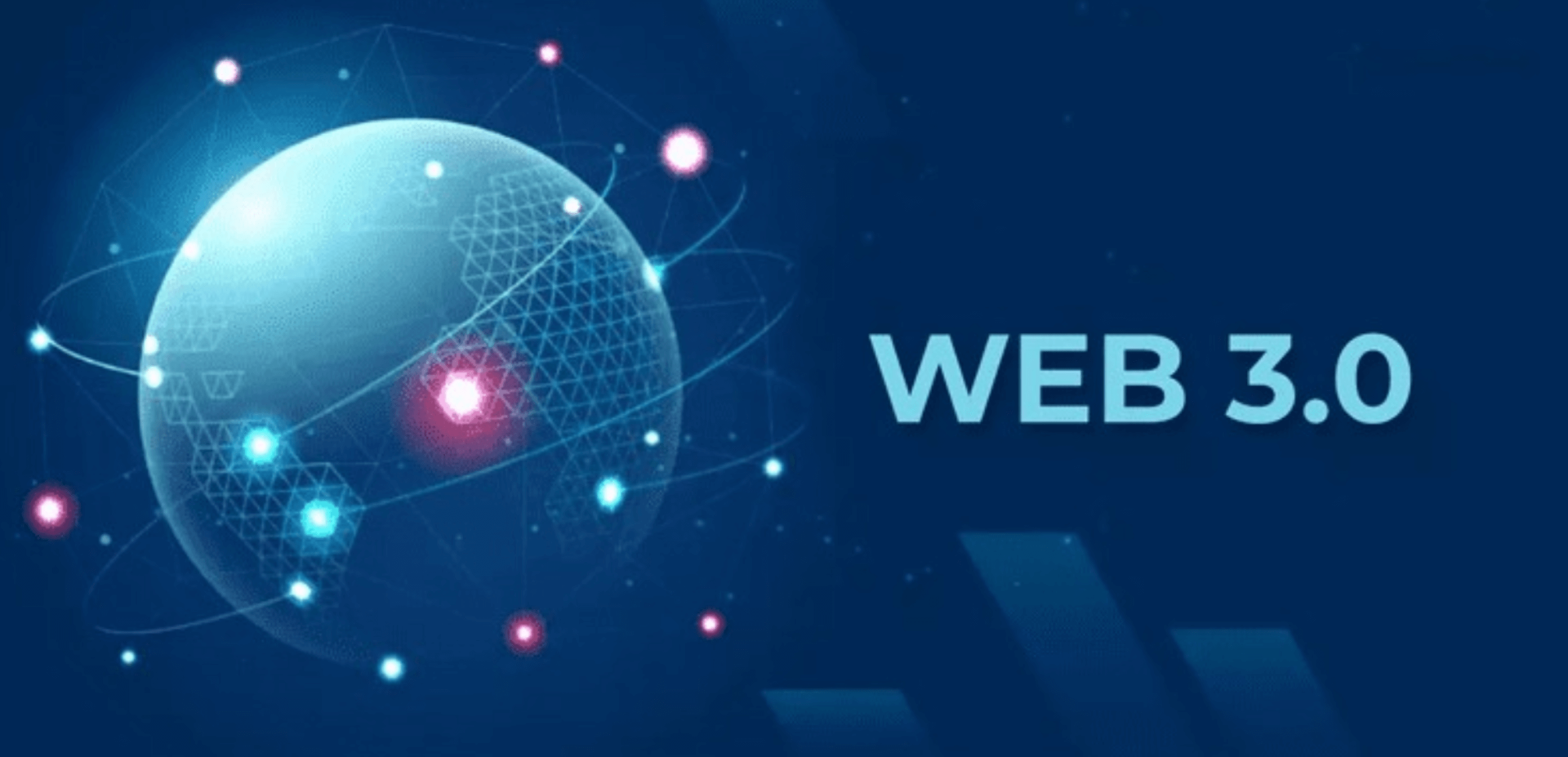
The impact of Web 3.0 is expected to be significant across society and the wider economy.
Here are some aspects which will be revolutionised by Web 3.0:
Decentralization: Web 3.0 will allow for a more decentralized web, with users having greater control over their personal data.
Increased privacy: With decentralized data storage and greater user control over personal data, privacy is expected to increase significantly.
Improved user experience: Web 3.0 will bring a more immersive and interactive experience through the use of virtual and augmented reality.
Better security: Web 3.0 is expected to be more secure, with cryptographic techniques used to protect personal data and prevent fraud.
Greater efficiency: The use of blockchain technology in Web 3.0 will lead to greater efficiency and reduced costs in various industries.
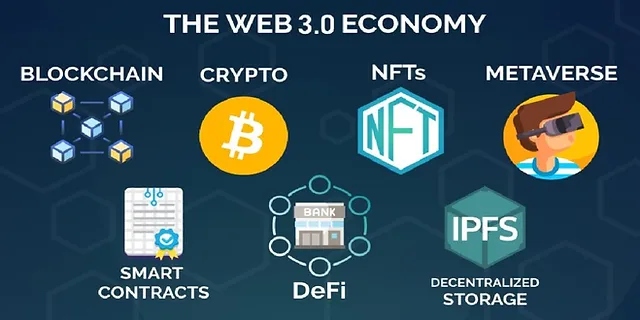
Web 3.0, also known as the decentralized web, is expected to have a significant impact on the economy and our society. It will create new ecosystems where interactions between the physical and digital worlds will be redefined, with individuals and organizations being able interact and transact directly, without the need for any intermediaries. This will likely lead to new business models, new revenue models, alternate investment instruments and forge new strategic partnerships. Investments in web 3.0 technologies have already skyrocketed and are expected to continue growing as business leaders become aware of their potential.
Converging technologies, such as artificial intelligence, IoT, and 5G, are also expected to play a major role in the development of web 3.0. These technologies will enable new decentralized applications and services that can improve efficiency, security, and transparency in various industries.
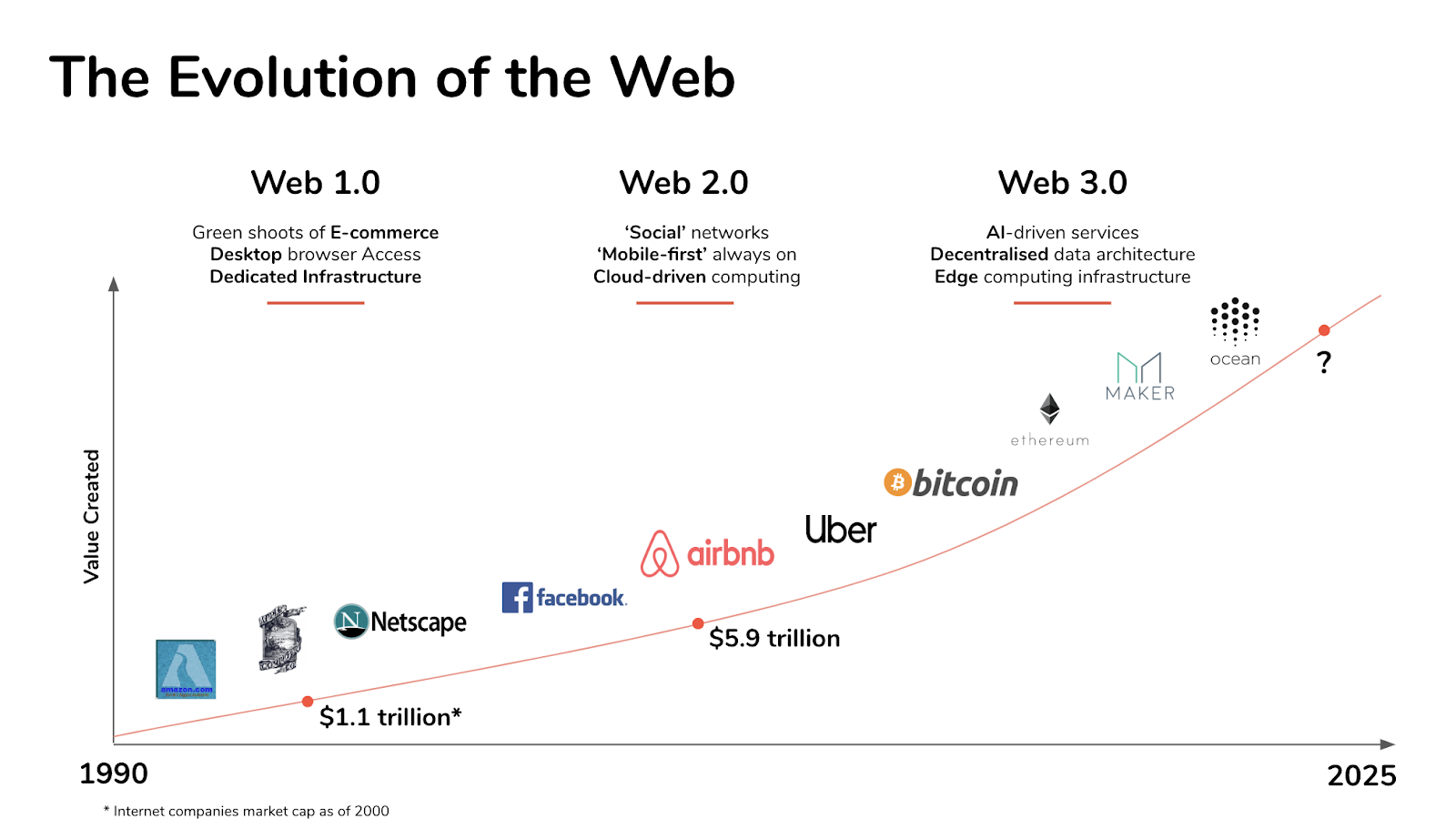
The COVID-19 pandemic has accelerated the adoption of digital technologies, as many businesses shifted to remote work and online sales to adapt to the changing circumstances. This has increased the demand for digital transformation solutions, particularly for remote collaboration and e-commerce.
The global market for digital transformation is expected to reach $6.8 trillion by 2026, growing at a CAGR (compound annual growth rate) of 15.5%. Digital transformation refers to the integration of digital technologies into all aspects of a business or organization, to improve efficiency, customer experience, and overall performance. The increasing adoption of digital technologies across various industries, such as manufacturing, healthcare, retail, and finance, is driving the growth of the digital transformation market. The use of cloud computing, big data analytics, artificial intelligence, and the Internet of Things (IoT) are some of the key technologies driving digital transformation.
The global market for the metaverse, a term used to describe a virtual world where users can interact with each other and digital objects, is expected to reach $758.6 billion by 2026.
Some of the key Web 3.0 economy indicators worth noting are:
Increased users: As more people become aware of the benefits of web 3.0 technologies, such as blockchain, and decentralized finance (DeFi), the number of users is expected to grow. This trend will likely be driven by the increasing adoption of these technologies across various industries, as well as by the growing interest in the decentralized web.
An increased number of technologies: The web 3.0 ecosystem is expected to see an increase in the number of emerging and frontier technologies. Examples include digital twins, federated learning and advanced computing technologies.
Vibrant entrepreneurship ecosystem: The emergence of web 3.0 has lead to an exponential increase in the number of startups and scaleups that are focused on developing decentralized technologies and applications.
Increased transactions: As more people start using web 3.0 technologies, the number of transactions on these platforms is expected to increase. This includes transactions related to decentralized finance (DeFi), digital currencies, and decentralized marketplaces, among others.
Increased investments: As more people become aware of the potential of web 3.0 technologies, investments in these technologies is expected to increase. This includes investments by venture capitalists, institutional investors, and retail investors.
Increased M&A activity: As the web 3.0 ecosystem continues to grow and mature, there may be an increase in mergers and acquisitions (M&A) activity
The market drivers for Web 3.0 include the increasing demand for decentralized applications, the rise of digital assets and non-fungible tokens (NFTs), and the growth of decentralized finance (DeFi) and centralized finance (CeFi) platforms. Defi refers to financial applications and services built on blockchain technology that operate without intermediaries, while CeFi refers to traditional financial services built on centralized platforms. Both DeFi and CeFi are driving the growth of digital assets and the emergence of new financial instruments and markets.
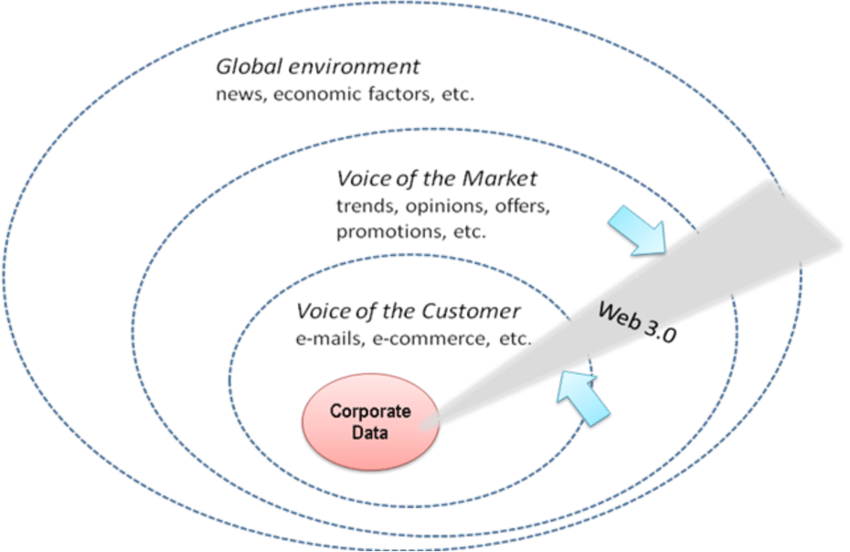
Web 3.0 infrastructure, such as decentralized storage and computation platforms, will also play a key role in creating new business ecosystems. These platforms will provide the necessary infrastructure for decentralized applications (dApps) and services and will enable new business models and use cases.
Emerging and frontier technologies such as artificial intelligence, the Internet of Things (IoT), and 5G or 6 G networks will also play a key role in building new business ecosystems through web 3.0. These technologies will enable new decentralized applications and services that can improve efficiency, security, and transparency in various industries.
The transition to Web 3.0 is marked by the convergence of various technologies, including blockchain, artificial intelligence (AI), robotics, augmented reality (AR), virtual reality (VR), extended reality (XR), 3D printing, 5G and 6G networks, the Internet of Things (IoT), next-generation computing, quantum computing, DNA computing, neuromorphic computing, and edge computing. These technologies are expected to work together to create a more decentralized and autonomous web, where individuals have greater control over their data and digital identities.
Blockchain technology, is seen as a key enabler of Web 3.0, as it provides the infrastructure for decentralized applications and digital assets. AI, meanwhile, is expected to play a major role in automating processes and decision-making, while robotics, AR/VR/XR, and 3D printing will help to enhance physical interactions with the digital world. 5G and 6G networks will provide faster and more reliable connectivity, while IoT will enable the connection of a vast array of devices and systems. Next-generation computing technologies, such as quantum computing, DNA computing, neuromorphic computing, and edge computing will increase the power and capabilities of the systems we use. All of these technologies are expected to come together to create a more efficient, secure, and decentralized web.
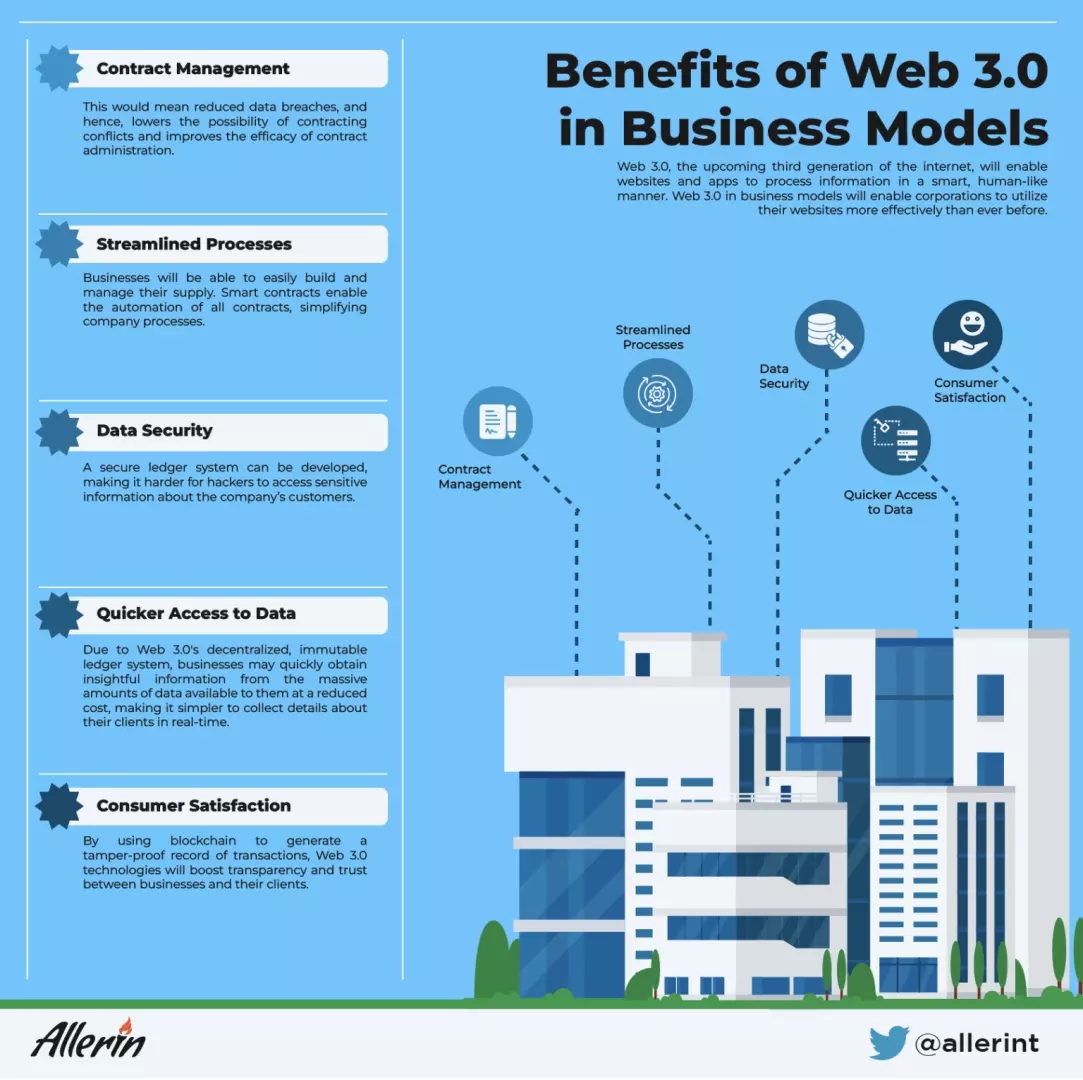
The web 3.0-powered metaverse is expected to have a significant impact on society and the economy, as it will create new opportunities for social interaction, entertainment, and commerce. One of the most significant impacts of the metaverse is the potential for it to create new forms of social interaction and community building. Users will be able to create and participate in virtual experiences and events, connecting with people from around the world in new and exciting ways.
A more mature metaverse ecosystem is expected to fully leverage web 3.0 architecture and to have a significant impact on the entertainment and media industries, as it will provide new opportunities for immersive and interactive storytelling, gaming, and other forms of digital content.
In e-commerce, the metaverse can create new opportunities for virtual marketplaces and digital goods. The metaverse can also provide new ways of interacting with customers and partners, as well as new business models and alternate revenue streams.
The evolving metaverse can also have a positive impact on the economy by creating new jobs and opportunities for entrepreneurs and small business owners. This includes jobs in design and development, content creation, and community management.
Web 3.0 is expected to create new business ecosystems by enabling digital transformation and business transformation through the use of decentralized technologies such as blockchain. Digital currencies, also known as cryptocurrencies, are one of the most prominent examples of how web 3.0 is creating new business opportunities. These currencies allow for fast, secure and transparent transactions, and can be used to facilitate the creation of decentralized financial systems, such as decentralized finance (DeFi).
Omnichannel marketing and e-commerce platforms will also be impacted by the emergence of web 3.0. These platforms will enable businesses to connect with customers through a variety of channels, such as social media, email, and SMS, and will provide new opportunities for personalization and engagement.
The transition to Web 3.0 is expected to encounter major challenges, including privacy, cyber threats, regulatory, legal, and environmental, social and governance (ESG) concerns.
Web 3.0 will likely play a dual role, as it can be a powerful tool in our privacy and security arsenals, however it can also represent a significant vulnerability if not deployed with adequate governance guardrails in place. Proactive digital ethics and cyberdefense systems must be at the top of the agenda for business and government leaders in order to secure web 3.0's role as a pathway to digital trust.
Regulatory and legal challenges are also likely to arise, as decentralized systems may not be adequately covered by existing laws and regulations. ESG concerns may also arise, as decentralized systems may have unintended impact on the environment and society, and customized metrics for each industry are still under development.
To overcome these challenges, it is important for the industry to work closely with regulators and policymakers to develop appropriate laws and regulations. Additionally, the industry must invest in research and development to improve the security, privacy and trust of the systems, and to address ESG concerns.
It is important to increase our advocacy efforts, as well as enhance web 3.0 digital literacy and fluency, so that key stakeholders and business leaders can make informed decisions regarding a state of the art web 3.0 strategy.
Despite the foreseeable challenges, the transition to Web 3.0 also presents us many opportunities if we engage in global, multi-stakeholder, collaborative efforts. Some of the opportunities include democratization of data, building a culture of digital ethics and cyber resilience, promoting social entrepreneurship, supporting digital and financial inclusion, as well as accelerating attainment of the United Nations SDG 2030 agenda and United Nations 2050 Net Zero Coalition.
If deployed responsibly, Web 3.0 can also evolve to become a powerful pathway and catalyst for Human Rights.
Ingrid Vasiliu-Feltes, MD MBA Is a healthcare executive, futurist and globalist who is highly dedicated to digital and ethics advocacy. She is a Forbes Business Council member, digital strategist, passionate educator and entrepreneurship ecosystem builder, known as an expert speaker, board advisor and consultant. Throughout her career she has received several awards for excellence in research, teaching or leadership. She is the recipient of numerous awards most notably: WBAF World Excellence AwardSocial Entrepreneurship 2021, Top 20 Global Leaders in Digital Twins Technologies, Top 50 Global Leaders in Health Tech,Top 50 Global Ecosystem Leaders, Top 100 Visionary In Education Award 2021, Top 100 Global Women in Leadership Award 2021, Top 100 World Women Vision Award, 2021-Innovation & Tech, Top 100 Women in Social Enterprise 2021 (nominee),Top 50 Global Thinkers (Nominee),Nations of Women Change Makers Award(finalist),Top 100 Healthcare Leader 2020 Award, Top 100 Finance Leader 2020 Award, and Top 100 Women in Crypto 2020. Additionally, she serves as an Expert Advisor to the EU Blockchain Observatory Forum, and was appointed to the Board of UN Legal and Economic Empowerment Network. Dr. Vasiliu-Feltes is CEO of Softhread Inc., the Founder and CEO of The Science, Entrepreneurship and Investments Institute, and currently serving as a Country Director for WBAF USA, Senator of WBAF, Faculty Member of the WBAF Business School-Division of Entrepreneurship, and teaching the Executive MBA Business Technology Course at the UM Business School. She is also acting as the Chief Innovation Officer for the Government Blockchain Association. Most recently she served as President of Detect Genomix, Chief Quality and Safety Officer Chief and Innovation Officer for Mednax, Chief Quality and Safety Officer and Chief of Compliance for the University of Miami UHealth System During her academic tenure she taught several courses within the Medical School, as well as the combined MD/PhD and MD/MPH programs. Throughout her career, Dr. Vasiliu-Feltes held several leadership positions and is a member of numerous prestigious professional organizations. She holds several certifications, such as Bioethics from Harvard, Artificial Intelligence and Business Strategy from MIT Sloan, Blockchain Technology and Business Innovation from MIT Sloan, Finance from Harvard Business School, Negotiation from Harvard Law School, Innovation and Entrepreneurship from Stanford Graduate School of Business, Certified Professional in Healthcare Risk Management, Fellow of the American College of Healthcare Executives, Patient Safety Officer by the International Board Federation of Safety Managers, Master Black Belt in Lean and Six Sigma Management, Professional in Healthcare Quality by the National Association of Healthcare Quality, Manager for Quality and Organizational Excellence, by the American Society for Quality, and Certified Risk Management Professional by the American Society for Healthcare Risk Management. Additionally, Dr. Vasiliu-Feltes is an Honorary Advisory Board Member of several companies, as well as an Editorial Board Member for several international publications, an author and TV/Media partner.
Leave your comments
Post comment as a guest